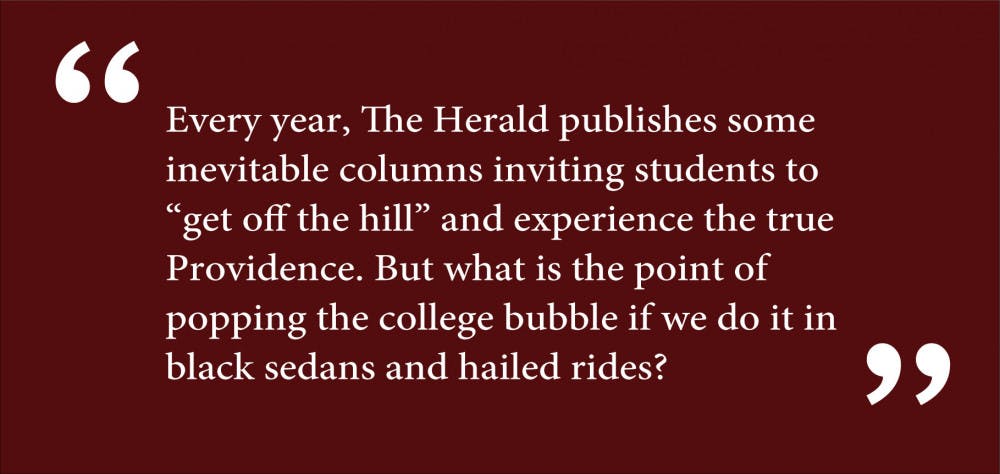My hometown is not known for its public transportation. In Los Angeles, we care more about our car culture and our avocados than we do about the local Metro stations, though the city is currently trying to build infrastructure on the levels of New York, Boston and Washington, D.C. So when I came to Providence to attend Brown, it didn’t bother me that the city had no light rail or subways. But what the city and state lack in rail transport, they make up for in an army of buses.
Almost everyone has heard the announcement, “CAUTION: BUS IS TURNING,” like clockwork from the Thayer Street tunnel that serves as our connection to the rest of Providence. Every day, I see Brown staff members and other local residents line up for the buses that crisscross the city. These vehicles, plastered with hospital advertisements and smiles, transport the lifeblood of the University on a daily basis. The one group I wish I saw more of on the buses, however, is Brown students.
It’s not like cost is an issue here. For almost a decade, Brown has paid all bus fees for students who use their student IDs on the Rhode Island Public Transportation Authority. This in itself gives Brown students an advantage: I can assure you that students at Columbia and New York University don’t get free rides on New York City public transportation. Not to mention, we also have access to the Brown onCall shuttle service, which only increases our options for safe, free transportation to and from campus.
Yet today, many students who can afford to hail an Uber or Lyft would rather pay inordinate amounts in surge pricing than set foot into public transportation. I can understand relying on rideshares when traveling to underserviced areas, while under time constraints or during late night runs. But when I see sheer laziness or an aversion to public transportation (which is, again, free for students) among my peers? That amazes me in its stupidity. It also reveals a lot about us as a student body and how we interact with the greater Providence community — or, more specifically, how we fail to engage with it at any deep level.
Why is there an ingrained prejudice against public transportation in certain places? For a start, we are more inclined to support public transportation when we don’t use it ourselves. As one Onion article hilariously spoofs, “98 Percent of U.S. Commuters Favor Public Transportation For Others.” CityLab reports that people who don’t travel on public transportation often believe it leads to indirect benefits for their communities, including creating less traffic overall. But these same respondents are not inclined to ever use it themselves, citing a range of different excuses.
Others argue that when public transportation improves, it solely helps those at the top of the socioeconomic food chain. And as Brown students who attend one of the wealthiest institutions in the state, we are definitely at the top. It’s the reason why there is nearly nonstop bus service between Eastside Marketplace and campus, while late-night Taco Bell and Pizza Hut workers can wait up to an hour in Kennedy Plaza for the same service. These are people that could use our RIPTA privileges a lot more than we do.
I’ve seen this apathy with my own eyes. There are students who humble-brag about helping Rhode Island’s neediest for their volunteer positions, but would rather pay out of their own pocket for roundtrip Ubers than take the same transportation as those they claim to help. A fellow student once earnestly asked me at a bus station if I ever felt unsafe waiting to get on the R Line. I incredulously pointed at the 24-hour police station directly across from the bus stop, lit up like a Christmas tree. It does not escape my mind that perhaps this question had something to do with the fact that the R Line serves most of the state’s vibrant black and Latinx communities. Transportation should be equitable, but it is subject to the same stereotypes, socioeconomic divides and prejudices that affect nearly all aspects of American life — issues that we at Brown are not immune from.
Every year, The Herald publishes some inevitable columns inviting students to “get off the hill” and experience the true Providence. But what is the point of popping the college bubble if we do it in black sedans and hailed rides? Back in 2008, Brown would compensate the equivalent of 20,000 RIPTA rides in one month alone — but that was right before the advent of Lyft and Uber. Nowadays many people are willing to shell out extra cash for the convenience, privacy and free charging plugs. God forbid they have to wait — yes, wait — for a bus with adults they don’t know. These students are not popping the bubble — they are making it bigger.
In high school, one of my L.A. friends did not have a car. He lived quite a while away, and traveled to and from school every day on a bus I didn’t even know existed. I had the privilege of a car (a terrible one, though still a car), but I don’t think I fully understood his predicament until I moved across the country. Now that I have experienced what it is like to view public transportation as a necessity rather than an option, I have come to realize that it doesn’t deserve the bad rep some students give it. The RIPTA service has helped me recover my wallet from Connecticut, plan activities with my friends and travel the state. But it has also made me aware of some of the privilege that affects our student body. I still take Ubers to get places, but rest assured that you will see me checking the bus schedule first.
Mark Liang ’19 can be reached at mark_liang@brown.edu. Please send responses to this opinion to letters@browndailyherald.com and other op-eds to opinions@browndailyherald.com.





